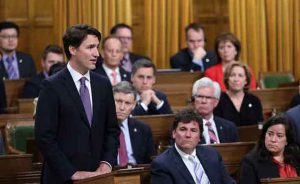THUNDER BAY – POLITICS – I remember him distinctly. Working in the Prime Minister’s Office during one of the national conferences on Indigenous Self Government, I recall Chief Bill Wilson to be a formidable if no-holds-barred negotiator and an effective voice for the rights of Canada’s First Peoples. In a now famous exchange with then Prime Minister Pierre Elliot Trudeau, himself never at a loss for a sharp retort, Chief Wilson got the better of him when he “warned” Trudeau the Elder that one of his daughters would one-day become Prime Minister. Amidst the guffaws and chortles, no one in that room except Chief Wilson would have expected that his daughter Jody Wilson-Raybould would become Canada’s Minister of Justice and Attorney General over thirty-five years later.
Among the small cadre of senior ministers, the first Indigenous woman to become Minister of Justice, she was one of the most effective and influential in Trudeau’s cabinet. Fully committed to building bridges of reconciliation and of doing politics differently, she was admired for her straightforward manner, her commitment and integrity.
It caught all attentive Canadians by surprise when she was suddenly moved from the Justice portfolio to the relatively junior position of Minister for Veterans Affairs. But make no mistake, Minister Wilson-Raybould was not “shuffled” in this pre-election re-arranging of cabinet deck chairs. She was fired! She has since resigned from cabinet, and probably for very good reason!
Let’s cue the context of this story that the Prime Minister’s Office (PMO) would likely keep swept under the rug.
SNC-Lavalin is a multi-million-dollar multinational corporation with expertise in engineering and infrastructure services. They have operated in most of the countries of the world receiving billions in contract dollars while employing 9,000 people in Canada alone. Of paramount importance in this emerging scandal is the location of its international headquarters which is in Montreal, but a stone’s throw away from the Prime Minister’s riding. The Quebec government considers SNC-Lavalin to be one of the ten keystone corporations in the province. Furthermore, and of vital importance to this sordid saga, it is also one of the major financial contributors to the Liberal Party of Canada.
The corporation’s legal troubles began some time ago when they were caught attempting to bribe officials in the Bangladeshi government respecting the awarding of a multi-million- dollar contract underwritten by the World Bank, the international community’s preeminent source of loan and grant monies for the developing world. This blatant act of bribery and corruption had SNC-Lavalin banned from any further bidding on World Bank contracts, costing the corporation a king’s ransom.
Seemingly undeterred by this significant setback they compounded the fraud by twice repeating the same mistake in Libya. Not wanting to leave their home base out of the mix, SNC-Lavalin was again caught up in bribery charges involving the construction of a Montreal hospital.
Although she has remained wisely mute on the subject, it is generally held that Minister Wilson-Raybould was preparing to proceed to trial with formal bribery and corruption charges against the corporation.

Then came the wrinkle in the rug! Cue PMO!
Based on recently adopted legislation on corporate crime in Canada Minister Wilson-Raybould could have instructed her officials to enter into negotiations with SNC-Lavalin and grant a “deferred prosecution agreement” permitting the corporation to wring their hands, apologize for their improprieties, fork over a fine and avoid the public humiliation and cost of lengthy trial proceedings. No doubt this strategy would also serve to reduce any negative public perception of the severity of their crimes. Further, there is a vital monetary advantage to pursuing this option: If a full and open trial produced a guilty verdict, SNC-Lavalin would be prohibited from bidding on Canadian contracts resulting in a severe impact on their financial bottom line. A “deferred prosecution agreement” would not so restrict SNC-Lavalin. The Minister however apparently refused this option and, playing no favourites, believed that she had sufficient evidence to proceed to trial and obtain a conviction, thereby sending a clear message to Canada’s corporate community that fraud and bribery are not acceptable ways to conduct business in Canada or anywhere else.
The major issue at stake is whether or not the Prime Minister or operatives in his office attempted to influence the Minister of Justice and Attorney General for Canada by pressuring her to move to a deferred prosecution agreement with SNC-Lavalin.
As reported in the Globe and Mail, SNC-Lavalin senior officials or their minions met with federal parliamentarians and government officials over 60 times in the past 24 months. This included a dozen meeting with Trudeau’s senior Quebec advisor in PMO. Lawyered to the hilt, can anyone be led to believe that SNC-Lavalin did not lobby for a deferred prosecution agreement? With so many vital strategic political factors at play, how could PMO be anything but “interested” in the outcome of the Justice minister’s decision? It is more than conceivable that if not Trudeau himself, then one or more of his eager political operatives in PMO, “suggested” to Wilson-Raybould that she might wish to “soften” her indictment and trial approach to SNC-Lavalin and pursue the deferred option.
Enter the doctrine of “plausible deniability”. In its political context, especially in the PMO where the concept assumes the status of doctrine if not dogma, plausible deniability is the ability for a Prime Minister to deny knowledge of, or any responsibility for any potentially politically damaging activities committed by those in his inner circle of advisers. The key to the use of plausible deniability by the Prime Minister is to ensure a complete lack of evidence that can confirm his participation in or knowledge of an action or event.
This lack of direct evidence then makes the denial of knowledge of, or participation in the action or event not only plausible but credible – due to the general good will of Canadians to want to believe their leaders coupled with the intimidating awe with which the Office of Prime Minister is held. Having worked in that office, I know how awe-inspiring and intimidating that can be!
Trudeau feigned or claimed ignorance and said he was disappointed in her resignation stating “ . . . .If anyone, particularly the attorney-general, felt that we were not doing our job responsibly and according to all the rules as a government, it was her responsibility to come forward to me this past fall and highlight that directly to me. She did not. Nobody did and that is why I continue to be puzzled.” This stretches the doctrines of plausible deniability to its extreme. Yes, you must protect the boss at all costs saving him from embarrassing guffaws and admitting ignorance is often so much better than admitting complicity – but the buck stops with him. If the political advisors in PMO were actively engaged in negotiations with SNC-Lavalin, they did Trudeau no favours by keeping him in the dark. So did they do so or not? Regardless this is a lose-lose situation for the hapless Prime Minister.
For fear of further embarrassing a major Quebec-based engineering company and alienating a well-monied donor, Minister Wilson-Raybould was fired – essentially for doing her job as Canada’s senior law enforcement official.
Canada’s first Indigenous Minister of Justice is the real victim in this tragic story, her competence and commitment sacrificed on the altar of political expediency and a well-monied corporation fearful of further tattering its reputation for scandal and corruption. And as Canadians, we are all the worse for it. Not only was she committed to reconciliation but hers was a senior voice at the policy tables on Canada – First Nations issues. In the long run, that influential and articulate voice is what we shall come to miss the most.
Peter Andre Globensky worked as a Senior Policy Advisor on Aboriginal Constitutional Issues in the Office of the Prime Minister of Canada in 1987-88.
The views, opinions and positions expressed by all columnists and contributors are the author’s alone. They do not inherently or expressly reflect the views, opinions and/or positions of NetNewsLedger.







